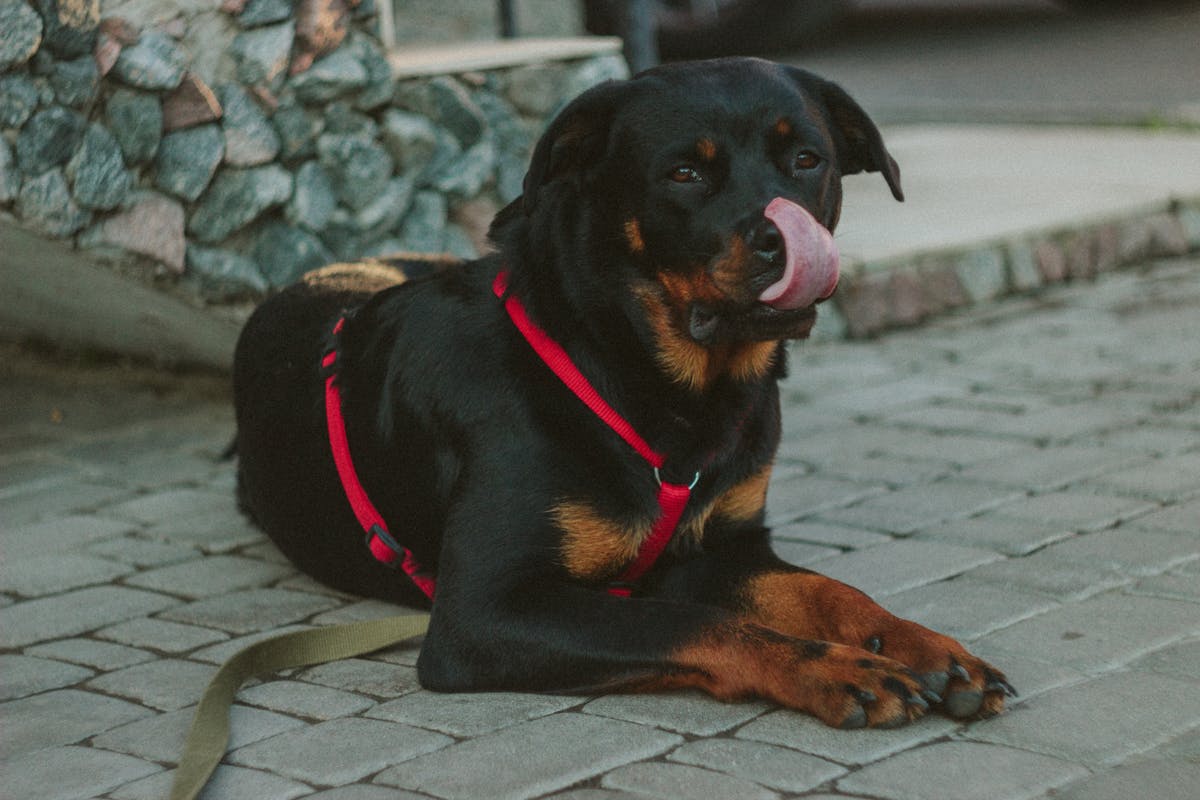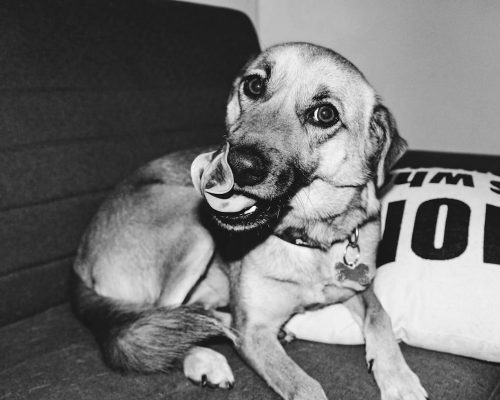The Rottweiler is one of the oldest and most robust working breeds in the world. With its muscular physique and keen intelligence, this breed has been admired for centuries as a loyal guardian and family companion. Rottweilers are celebrated for their protective instincts and calm demeanor when properly trained and socialized.
Table of Contents
ToggleA Brief History of the Rottweiler
Originating from the Roman Empire, Rottweilers descend from mastiff-like dogs used to herd cattle and guard livestock. When the Romans traveled across Europe, these dogs were essential in maintaining their herds.
Over time, Rottweilers became prevalent in the town of Rottweil, Germany, where they were used as butcher dogs, pulling carts of meat and safeguarding earnings. Today, the Rottweiler remains a symbol of strength, resilience, and versatility.
Rottweiler Physical Appearance and Characteristics
Rottweilers possess a striking appearance that exudes power and confidence.
- Size and Build: Adult males weigh between 95-135 pounds, and females typically weigh 80-100 pounds. Their compact, muscular frame gives them remarkable agility and endurance.
- Coat: Rottweilers have a short, dense double coat that is predominantly black with clearly defined rust-colored markings.
- Eyes and Expression: Their almond-shaped, dark brown eyes project a look of intelligence, alertness, and self-assurance.
Temperament of the Rottweiler
Rottweilers are known for their balanced yet assertive temperament. They are natural protectors but remain calm, loving, and loyal companions when raised in a nurturing environment.
- Loyalty and Devotion: Rottweilers form strong bonds with their families and thrive when included in daily activities.
- Protectiveness: This breed has innate guarding instincts, making them exceptional watchdogs.
- Intelligence and Trainability: Rottweilers are highly intelligent and eager to please, which makes them quick learners in both obedience and advanced training.
- Socialization Needs: Without proper socialization, Rottweilers may become wary of strangers or other animals. Early exposure to various people, pets, and environments is crucial.
Rottweiler Personality Traits
While every dog is unique, Rottweilers generally exhibit key personality traits:
- Confident: Rottweilers carry themselves with a natural self-assurance.
- Affectionate: Despite their tough exterior, they are affectionate and enjoy spending time with their human families.
- Playful: Rottweilers retain a playful side throughout their lives, often relishing outdoor activities.
Ideal Living Conditions for Rottweilers
Rottweilers adapt well to various living situations, provided their needs are met.
- Space Requirements: They thrive in homes with yards but can adjust to apartment living if exercised sufficiently.
- Exercise Needs: At least 60-90 minutes of daily physical activity is essential to keep a Rottweiler fit and mentally stimulated.
- Temperature Sensitivity: Due to their double coat, Rottweilers handle cooler weather well but may struggle in extreme heat. Adequate shade and hydration are key during summer months.
Training Your Rottweiler: Tips and Techniques
Rottweilers excel in training when approached with patience and consistency.
- Start Early: Begin obedience training as a puppy to instill good behavior.
- Positive Reinforcement: Reward-based training, using treats and praise, yields the best results.
- Firm but Kind Approach: Rottweilers respond best to calm, assertive leadership rather than harsh discipline.
- Advanced Training: Due to their intelligence, Rottweilers often excel in advanced obedience, agility courses, and protection work.
Socialization: Why It Is Critical for Rottweilers
Proper socialization ensures a well-rounded and confident Rottweiler.
- Early Introduction to People and Animals: Introduce your Rottweiler puppy to diverse individuals, other dogs, and new situations.
- Ongoing Exposure: Socialization should continue throughout adulthood to prevent territorial or aggressive tendencies.
- Professional Help: Puppy training classes or canine behaviorists can be invaluable for first-time Rottweiler owners.
Common Behavioral Issues and How to Address Them
Like all breeds, Rottweilers may develop behavioral issues if not properly guided.
- Destructive Chewing: Caused by boredom or teething in puppies; provide chew toys and ample exercise.
- Aggression: Proper socialization and consistent training mitigate aggressive tendencies.
- Separation Anxiety: Rottweilers bond deeply with their families and may struggle when left alone for long periods. Gradual crate training can help.
Grooming Needs of a Rottweiler
Rottweilers have relatively low grooming requirements but still need regular care:
- Brushing: Weekly brushing removes loose fur and minimizes shedding, especially during seasonal changes.
- Bathing: Bathe your Rottweiler every 6-8 weeks, or as needed, to keep their coat clean.
- Nail Trimming: Regular nail trims prevent discomfort or joint issues caused by overgrown nails.
- Ear Cleaning: Check ears weekly for dirt or infection, cleaning gently with a vet-recommended solution.
- Dental Care: Brush their teeth regularly to prevent gum disease and bad breath.
Rottweiler Diet and Nutrition
A balanced diet is key to maintaining a healthy Rottweiler.
- High-Quality Protein: Opt for premium dog food with meat as the primary ingredient.
- Portion Control: Overfeeding can lead to obesity, which strains their joints.
- Avoid Toxic Foods: Never feed chocolate, onions, garlic, or grapes, as they are toxic to dogs.
- Fresh Water: Provide access to clean, fresh water at all times.
Exercise Requirements for Rottweilers
Rottweilers are active dogs that require consistent exercise.
- Daily Walks: Long walks are essential for physical and mental stimulation.
- Playtime: Engage in games like fetch or tug-of-war to bond with your Rottweiler.
- Mental Challenges: Incorporate puzzle toys and obedience drills to challenge their intelligence.
- Advanced Workouts: Agility training or weighted walks can help burn extra energy.
Health Issues Common in Rottweilers
Rottweilers are prone to several genetic health conditions:
- Hip and Elbow Dysplasia: Joint malformation causing pain and mobility issues.
- Aortic Stenosis: A congenital heart condition requiring regular monitoring.
- Cancer: Rottweilers have a higher susceptibility to certain cancers like osteosarcoma.
- Obesity: Maintain a healthy diet and exercise routine to prevent weight-related complications.
Routine Vet Visits and Health Screenings
Regular vet visits are vital for a healthy Rottweiler.
- Annual Checkups: Routine health screenings can detect issues early.
- Vaccinations: Keep up-to-date with core vaccinations.
- Spaying/Neutering: Discuss with your vet the best time for this procedure.
Rottweiler Lifespan and Longevity
Rottweilers typically live 8-10 years. A balanced diet, exercise, and regular medical care can significantly enhance their quality of life.
Are Rottweilers Good Family Dogs?
With proper training, Rottweilers make excellent family companions. Their affectionate and loyal nature allows them to bond well with children and adults alike. Supervised play with smaller kids is important due to their size and strength.
Are Rottweilers Aggressive?
Rottweilers have an undeserved reputation for aggression. In reality, a well-socialized Rottweiler is calm, confident, and gentle. Aggression often stems from neglect, poor training, or lack of socialization.
Rottweilers as Working Dogs
Rottweilers excel as working dogs in various roles:
- Police and Military Work: Their strength and intelligence make them ideal for protection and detection tasks.
- Search and Rescue: Rottweilers possess exceptional scent-tracking abilities.
- Therapy and Service Dogs: Their calm demeanor makes them excellent therapy companions.
Pros and Cons of Owning a Rottweiler
Pros:
- Loyal and protective
- Intelligent and trainable
- Excellent working dogs
Cons:
- Requires ample exercise
- Can be prone to health issues
- Needs early and ongoing socialization
Conclusion: Is a Rottweiler Right for You?
Rottweilers are a versatile, loyal, and intelligent breed that can bring immense joy to the right family or owner. If you are committed to providing proper training, exercise, and care, a Rottweiler can be a lifelong companion and protector.






